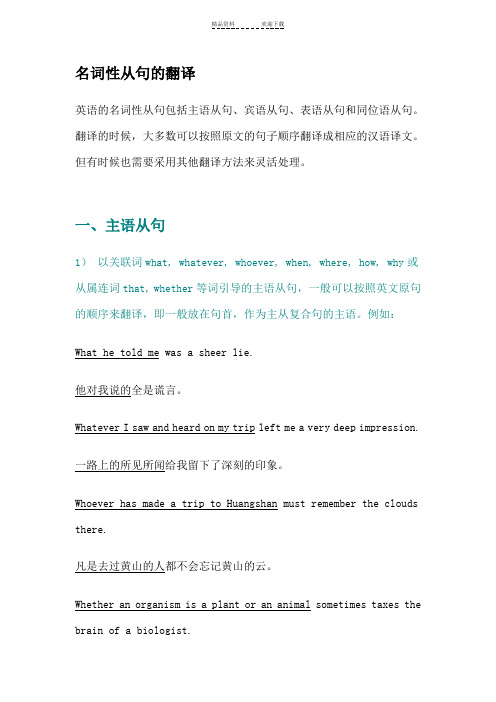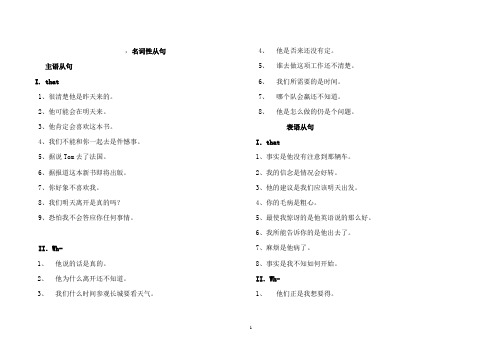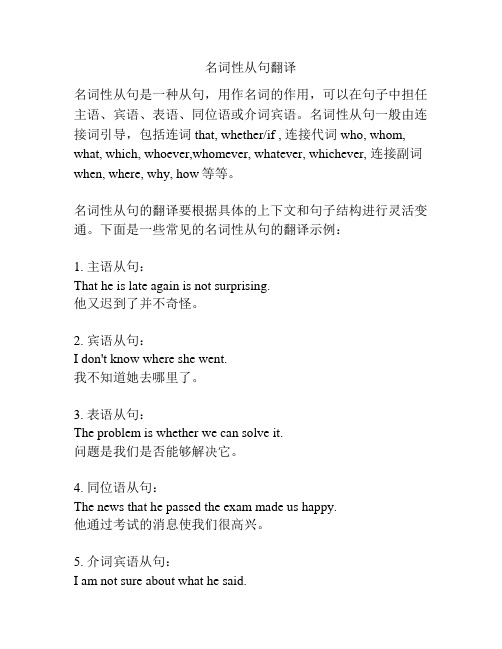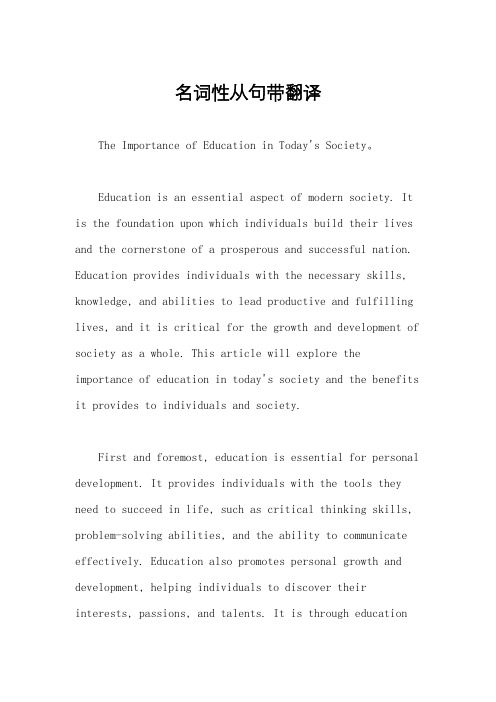翻译第十一讲(名词性从句&状语从句译法)
英译汉——名词性从句的译法

考研英语每日一课(英译汉——名词性从句的译法)英译汉——名词性从句的译法英语名词性从句包括主语从句,宾语从句, 表语从句和同位语从句, 在翻译这类从句时, 大多数可以按照原文的句序翻译成相应的汉语,但是也有一些具体的处理方法,下面我们结合一些实例加以说明:例1.How andwhenhuman lang uagedevel opedand w hethe r ani malssuchasch impan zeesand g orill as ca n dev elopa mor e ela borat e sys tem o f com munic ation areissue s atprese nt be ing r esear ched, butas ye t lit tle u nders tood.人类的语言是如何发展起来的, 是什么时候形成的, 诸如黑猩猩和大猩猩一类的动物是否会形成一种更加复杂的交流系统,都是现阶段人们研究的课题, 但对此人们都知之甚少。
(主语从句)例2.How w ell t he pr edict ion w ill b e val idate d bylater perf orman ce de pends upon theamoun t, re liabi lity, andappro priat eness of t he in forma tionusedand o n the skil l andwisd om wi th wh ich i t isinter prete d. (95年考题)这些预测能在多大程度上被后来的成绩所证实取决于所使用的信息的量、可靠性和适合程度,并取决于对信息作出解释的技能和智慧。
名词性从句的翻译

名词性从句的翻译英语的名词性从句包括主语从句、宾语从句、表语从句和同位语从句。
翻译的时候,大多数可以按照原文的句子顺序翻译成相应的汉语译文。
但有时候也需要采用其他翻译方法来灵活处理。
一、主语从句1)以关联词what, whatever, whoever, when, where, how, why或从属连词that, whether等词引导的主语从句,一般可以按照英文原句的顺序来翻译,即一般放在句首,作为主从复合句的主语。
例如:What he told me was a sheer lie.他对我说的全是谎言。
Whatever I saw and heard on my trip left me a very deep impression.一路上的所见所闻给我留下了深刻的印象。
Whoever has made a trip to Huangshan must remember the clouds there.凡是去过黄山的人都不会忘记黄山的云。
Whether an organism is a plant or an animal sometimes taxes the brain of a biologist.一种生物究竟是植物还是动物,有时会让生物学家颇伤脑筋。
2) 对于it作形式主语的主语从句,可以先译主句,顺译为无人称句。
有时也可先译从句,再译主句,这样的话,一般需要在主句前加译“这”。
需要注意的是,如果强调it,可以将其译出;如果不需要强调,也可不译。
例如:It is strange that she should have failed to see her own shortcomings.真奇怪,她竟然看不出自己的缺点。
It seemed incredible that she should have lied to us.她居然对我们说谎,这真是不可思议。
It doesn’t make much difference to me whether you come or not.你来不来我不在乎。
名词性从句汉译英

,名词性从句主语从句I. that1、很清楚他是昨天来的。
2、他可能会在明天来。
3、他肯定会喜欢这本书。
4、我们不能和你一起去是件憾事。
5、据说Tom去了法国。
6、据报道这本新书即将出版。
7、你好象不喜欢我。
8、我们明天离开是真的吗?9、恐怕我不会答应你任何事情。
II.Wh-1、他说的话是真的。
2、他为什么离开还不知道。
3、我们什么时间参观长城要看天气。
4、他是否来还没有定。
5、谁去做这项工作还不清楚。
6、我们所需要的是时间。
7、哪个队会赢还不知道。
8、他是怎么做的仍是个问题。
表语从句I.that1、事实是他没有注意到那辆车。
2、我的信念是情况会好转。
3、他的建议是我们应该明天出发。
4、你的毛病是粗心。
5、最使我惊讶的是他英语说的那么好。
6、我所能告诉你的是他出去了。
7、麻烦是他病了。
8、事实是我不知如何开始。
II.Wh-1、他们正是我想要得。
2、问题是它是否值得一做。
3、问提是我们该作些什么来帮助他。
4、问题是谁留下。
5、那就是他出生的地方。
6、我们就是这样分手的。
7、我是你正在找的那个人。
8、这就是我去那的原因同位语从句I.that1、我听到了我们队获胜的消息。
2、他在会上什么都没说的事实使我们惊讶。
3、他打算来的消息使我们高兴。
4、他已经下定学好英语的决心。
5、他当选的消息不是真的。
II.Wh-1、我不知道他什么时候来。
2、你不知道我多么着急。
3、很难回答你提出的我是如何做的问题。
4、我提出的如何邀请他的问题已经得到了解决。
5、你为什么对音乐感兴趣的问题还没回答。
宾语从句I. That clause1,我认为他们学习很努力。
2,他说他将在11日动身。
3,他告诉我医生马上就来。
4,他说他妈妈在读书。
5,他说他的爸爸生于1948年。
6,我恐怕犯了一个错误。
7,我们有把握成功。
8,对不起我错拿了你的钢笔。
II.Whether/ if1,我想知道他明天是否来。
2,我想知道你是否愿意和我一起去看足球赛。
2005年高考英语第二轮总复习讲座之十一Unit11名词性从句

2005年高考英语第二轮总复习讲座之十一Unit11 名词性从句一、考点聚焦1、名词性从句中连接词的运用名词性从句中的连接词有连词that / whether / as if,连接代词what / who/ which / whose / whatever / whoever / whomever / whichever,连接副词where / when / why / how / wherever / whenever。
(1)that的用法。
①主语从句、表语从句、同位语从句中用that但不能省略。
如:That they are good at English is known to us all.The problem is that we don’t have enough money.She expressed the hope that they would come to China one day.②宾语从句中的连接词that有时可省有时又不可省,在以下几种情况中that不能省略:(A)当that从句和主句谓语动词之间有插入词语或者从句主语之间有插入语时,that不可省略;(B)当that 从句与另一名词性从句并列作宾语时,that不能省;(C)当that作介词宾语时,that不可省掉。
如:He judged that,because he was a child, he did not understandwineEveryone knew what happened and that she was worried.The reason lies in that she works harder than the others do.③that从句作主语和宾语时,可以用it 来替换成以下几种结构表达。
(A)It is clear/certain/likely/true/surprising that… (B)It is a pity/shame/good idea/no wonder that ...(C)It is said/reported/ believed/known/thought/suggested that … (D)It seems/happens that。
名词性从句

第十一章:翻译技巧9——名词性从句 灵活处理(宾语从句)
4. She was never satisfied with what she had
achieved.
bad.
难得的是一辈子做好事而不做坏事。 2. What the students find most difficult in English is its idiomatic usage. 学生感到英语最困难的地方是它的习惯用法。
6
第十一章:翻译技巧 9——名词性从句 灵活处理 (主语从句)
3. Whatever was said here must be kept secret.
可能有人会提出,无线电广播同样能够做到这一点;但 是在电视屏幕上,每个节目都显得更加生动,更加真实。
3. It is well known that alloy is a metal product containing two or more elements.
众所周知(大家都知道),合金是一种含有两种或两种 以上元素的金属产品。
物体在水中比在空气中轻,这是一种(大家共有的)常识。
11
第十一章:翻译技巧9——名词性从句 灵活处理(主语从句)
7. It seemed inconceivable that the pilot could
have survived the crash.
驾驶员在飞机坠毁之后竟然还活着,这看起来是不可 想象的事。 比较上述各句,联系英汉民族思维差异:英语民族 重直线思维,要点先给出,其他信息再一一增补;汉语 民族重曲线思维,先侧面,外围,后点出信息的重点。 因而,英语(前重心)是头短尾长,汉语是(后重心), 头大尾小。
1. It is reported that the Summit Meeting will be held in
名词性从句翻译

名词性从句翻译名词性从句是一种从句,用作名词的作用,可以在句子中担任主语、宾语、表语、同位语或介词宾语。
名词性从句一般由连接词引导,包括连词that, whether/if , 连接代词who, whom, what, which, whoever,whomever, whatever, whichever, 连接副词when, where, why, how等等。
名词性从句的翻译要根据具体的上下文和句子结构进行灵活变通。
下面是一些常见的名词性从句的翻译示例:1. 主语从句:That he is late again is not surprising.他又迟到了并不奇怪。
2. 宾语从句:I don't know where she went.我不知道她去哪里了。
3. 表语从句:The problem is whether we can solve it.问题是我们是否能够解决它。
4. 同位语从句:The news that he passed the exam made us happy.他通过考试的消息使我们很高兴。
5. 介词宾语从句:I am not sure about what he said.我不确定他说的是什么。
6. 间接引导名词性从句:He asked where I lived.他问我住在哪里。
7. 是否从句:I wonder whether/if she will come to the party.我想知道她是否会来参加派对。
8. 选择性从句:He asked me whether I preferred coffee or tea.他问我是喜欢咖啡还是茶。
9. 宾语从句(陈述句变为疑问句):Do you know what time it is?你知道现在几点钟吗?10. 宾语从句(连接代词):I wonder who is going to pick us up at the airport.我想知道谁会在机场接我们。
lecture 11 翻译技巧十 常见句型的翻译

这是我第一次和领导发生严重纠葛。
IV. 译成状语
有些定语从句从形式上看是定语,但在意义上与主 句有逻辑状语关系,对主句其原因、结果、目的、条件、 让步等状语作用,翻译时应尽可能按照其语法功能,译 成与汉语相对应的复句。
21. The computer, which seems to play the role of a human brain, is often called an e说来,限制性的定语从句可提前译成定语。 还有一些定语从句,虽然并不明显地带有限制性质, 但本身较短,和被修饰语的关系紧密,也可译成前 置定语。
1. To be sure, a great rebuilding project would give jobs to many of those people who need them. 诚然,一个宏伟的重建计划也许能为许多需要工作 的人提供就业机会。 2. This is the solider who just returned from the front.
他们对那些酬劳看来是很得意的,那些酬劳是他们历经
千辛万苦,通过取得令人难以置信的胜利得来的。
15. I told the story to John, who
(=and he) told
it to his brother.
我把这件事告诉了约翰,约翰又告诉了他的 弟弟。
这种采取后置的办法来处理非限制性定语从句,一般也 使用指示代词来重复英语关系代词所代表的含义。(如 例13)
本书旨在为写作提供范例,可以说这一直是一个难 题。
8. Matter is composed of molecules that are composed of atoms.
名词性从句带翻译

名词性从句带翻译The Importance of Education in Today's Society。
Education is an essential aspect of modern society. It is the foundation upon which individuals build their lives and the cornerstone of a prosperous and successful nation. Education provides individuals with the necessary skills, knowledge, and abilities to lead productive and fulfilling lives, and it is critical for the growth and development of society as a whole. This article will explore the importance of education in today's society and the benefits it provides to individuals and society.First and foremost, education is essential for personal development. It provides individuals with the tools they need to succeed in life, such as critical thinking skills, problem-solving abilities, and the ability to communicate effectively. Education also promotes personal growth and development, helping individuals to discover their interests, passions, and talents. It is through educationthat individuals can realize their full potential and achieve their goals.In addition to personal development, education is critical for economic development. In today's global economy, education is the key to success. It provides individuals with the skills and knowledge they need to compete in the workforce and contribute to the economy. A well-educated workforce is essential for the growth and development of businesses and industries, and it iscritical for the economic success of a nation.Education also plays a crucial role in promoting social mobility and reducing inequality. It provides individuals from all backgrounds with the opportunity to improve their lives and achieve their goals, regardless of their social or economic status. Education is a powerful tool for breaking down barriers and creating a more equitable society.Furthermore, education is essential for promoting democracy and civic engagement. It provides individualswith the knowledge and skills they need to participate in the democratic process and make informed decisions. Education also promotes civic responsibility, encouraging individuals to be active and engaged members of their communities.Finally, education is critical for promoting global understanding and cooperation. In today's interconnected world, education is essential for promoting cultural understanding and tolerance. It provides individuals with the knowledge and skills they need to communicate effectively with people from different cultures and backgrounds, promoting peace and cooperation on a global scale.In conclusion, education is essential for personal, economic, and social development. It provides individuals with the tools they need to succeed in life, contributes to the growth and development of society, and promotes democracy, social mobility, and global understanding. As such, education should be a top priority for individuals, governments, and societies around the world.。
- 1、下载文档前请自行甄别文档内容的完整性,平台不提供额外的编辑、内容补充、找答案等附加服务。
- 2、"仅部分预览"的文档,不可在线预览部分如存在完整性等问题,可反馈申请退款(可完整预览的文档不适用该条件!)。
- 3、如文档侵犯您的权益,请联系客服反馈,我们会尽快为您处理(人工客服工作时间:9:00-18:30)。
四、表示让步的状语从句(汉语表条件一般前置,英语灵活) 1、借助“虽然”、“尽管”、“即使”、“就算”等词: While I grant his honesty, I suspect his memory.
2、借助“不”、“不管”、“管”、“随”等词: No matter how good it is on paper, the bosses will try to wangle it all their own way.
五、表示目的的状语从句 1、译成表示“目的”的前置分句(为了) We should start early so that we might get there before noon.
2、译成表示“目的”的后置分句(省的、免得、生怕) The murderer ran away as fast as he could, so that he might not be caught red-handed.
She had always taken that for granted as correct behavior, however much it went against the things you were told. 汉语里有一种复句,前一分句排除某一方面的一切条件, 后一分句说出在任何条件下都会产生同样的结果,也就 是说结果的产生没有什么条件限制。这样的复句里的前 一分句,称之为“无条件”的条件分句。
用单词、短语做同位语的译法 1. They silently surrounded Tom, a young soldier, in order to take him prisoner.
On behalf of Mr. Green, president of Harvard, I am honored to take this opportunity for a toast.
2、同位语从句提前 They were very suspicious of the assumption that he would rather kill himself than surrender.
Yet, from the beginning , the fact that I was alive was ignored.
3、增加“即”或用冒号、破折号分开 But considering realistically, we had to face the fact that our prospects were less than good.
The meeting was to take place at a hotel, the Beijing Hotel on Chang’an Road.
2、根据汉语习惯和特点(意合),可以将一些原因状语从句 译成不用关联词而因果关系内(暗)含的并列分句。 I am going to bed, as I’m very tired. We had to put the meeting off since so many people were absent. “You took me because I was useful. There is no question of gratitude between us.” Said Rebecca.
状语从句
英语状语从句包括表示时间、原因、条件、让步、目的 等等各种从句。本讲就一些比较常见的处理方法说明如 下: 一、表时间的状语从句 1、译成相应的表示时间的状语 While I reached the beach, I collapsed. While she cooked, the cat slipped into the room.
三、表示条件的状语从句 一般多借助下列词语翻译条件状语从句: “只要”(最强)、“要是”、“一旦”、“如果”(最弱) If one of them dares to lay his little finger on me as we go out, I won’t answer for what I’ll be doing.
Please leave the key when you leave the room.
2、译成“刚(一)……就……”的句式 While I reached the beach, I collapsed.
The voice stopped as she drew near. We had barely dropped off when the doorbell began to ring.
四、同位语从句
1、同位语从句汉译时不提前 An obedient son, I accepted my father’s decision that I was to be a doctor, though the prospect interested me not at all. He expressed the hope that he would come over to visit China again.
2. I have been to all the cinemas in this city, big or small. We two like to go there.
3. In three hours we reached our destination, Qincheng Prison.
2、用it作形式宾语的句子,汉译时that引起的宾语从句一般 按原文顺序,it不译。
I make it clear to them that they must hand in their papers before 10 o’clock in the morning. 三、表语从句 That was how a small nation won the victory over a big power. 同于宾语从句,一般按原文顺序翻译。
3、译成并列的分句 She sang as she prepared Mary’s supper.
They were just about to give up the question, when suddenly they found the answer.
二、表示原因的状语从句 1、大多数原因状语从句在翻译时可以借助下列一些词语连 接完成:“因为”、“由于”、“因此”、“所以”。
It seemed inconceivable that the pilot could have survived the crash.
二、宾语从句 1、用that, what, how等引起的宾语从句汉译时一般不需 要改变它在原句中的顺序。
He could never let the history books say of him that he had been content to sit on the sidelines, to be a gentle, leisurely president, letting events take their course.
Translation(11)
名词性从句与状语从句译法
名词性从句
一、主语从句 1、以what, whatever, whoever等代词引导的主语从句翻译时 一般按原文顺序翻译。 What has happened is no surprise to us. We all know well enough what he is.
2、以it做假主语所引出的真主语从句,翻译时视情况可以 提前,也可以不提前。真主语从句提前译,为了强调,it一 般可以译出来;如果不需要强调,it也可以不译出来。
It doesn’t make much difference whether he attends the meeting or not.
